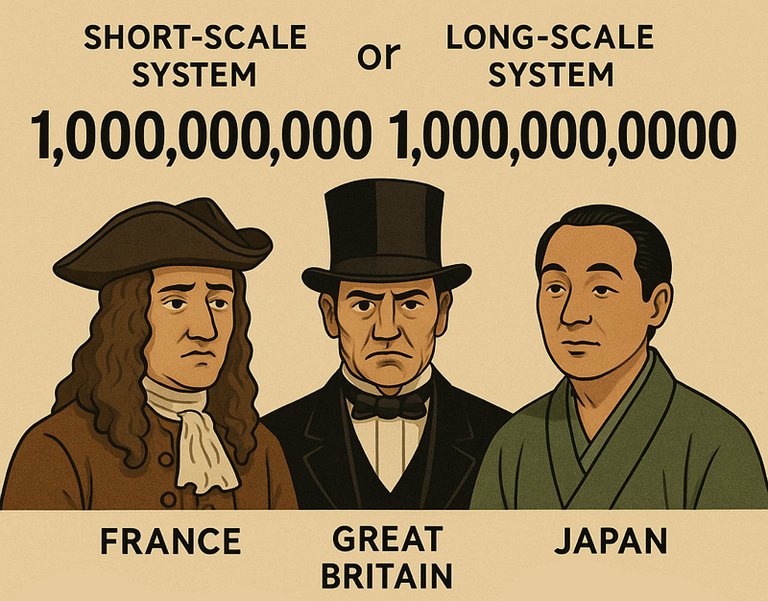Billions and Billions

You may know this trivia.
One billion has two different meanings. It can mean:
- One million million, i.e. 1,000,000,000,000
- One thousand million, i.e. 1,000,000,000
The former is called the long-scale system, while the latter is called the short-scale system. Simple enough, eh?
The British started using the long-scale billion around the 17th century, when a mere million just wasn’t impressive anymore. Then the French came up with the short-scale billion, arguing that it made more sense to count in groups of three zeros, thus creating a new unit every thousand.
Maybe just another thing for the French and English to fight about. But both systems do make sense. You can probably see the logic in each. So what to do when two systems both make sense and national pride prevents either side from giving in? Wait for a third party, of course!
That came in the 19th century, when the US offically adopted the French system. Well, you can guess what happened next.
After WWII, US culture dominated the globe, and the short-scale system became the norm nearly everywhere. The UK held up the fight for a long while, but eventually, in 1974, they gave in and officially switched to the short-scale system.
Woohoo! Standards prevail and one thousand million became a billion everywhere!
Well… not quite. This is the UK, after all. The country that officially switched to metric in 1965 and yet still uses in 2025 Imperial for beer, heatwaves, and body weight (and older folks use it for even more things). It’s not uncommon to come across references to a billion meaning a million million, and nothing will make sense unless your brain somehow catches the switch.

That trivia always amuses me.
In Japan, we use neither. After one thousand, there’s a fourth unit called man (万) for ten thousand.[1] From there, new units appear every ten thousand instead of every thousand.
I suppose, in that sense, Japan uses a sort of short-scale system, but a slightly tweaked one that groups digits by four zeros instead of three.
So whereas one thousand thousands is a million in the English-speaking world, ten thousand ten-thousands is an oku (億) in Japanese. And where one thousand millions makes a billion, ten thousand oku gives you a chō (兆).
Confusingly, Japan did adopt the Western way of writing numbers in three-digit groupings. So an oku appears as 100,000,000 instead of the more internally consistent 1,0000,0000. Go figure. Can’t make it easy for learners, eh?

Of course, then there’s the Indian system, which writes lakh (one hundred thousand) as 1,00,000 and crore (ten million) as 1,00,00,000. But I’m getting confused just writing that sentence, so we’ll end here. You’ll have to wait for the sequel to this post from @azircon to make sense of that one.
-
Pronounced mahn with an ah sound instead of ae which would make it sound like a human of the less-attractive sex instead of the elegant mathematical concept that it is. ↩
❦
 |
David is an American teacher and translator lost in Japan, trying to capture the beauty of this country one photo at a time and searching for the perfect haiku. He blogs here and at laspina.org. Write him on Mastodon. |
You received an upvote of 100% from Precious the Silver Mermaid!
Please remember to contribute great content to the #SilverGoldStackers tag to create another Precious Gem.
Yep! :)
100,000 = 1 Lakh
1,000,000 = 10 Lakh
10,000,000 = 1 Crore
Now the slangs: 1 lakh is also 1 peti (typically in Mumbai underworld)
1 crore is also 1 khoka … same in the Mumbai underworld. But both terms now is widely used in urban educated circles as “cool” .. like jailhouse fashion! ;)
Get it? :)
Haha jailhouse fashion. I suppose that's common everywhere.
Perfectly clear 😃
!PIMP !LADY !LOLZ !PIZZA !ALIVE
View or trade
LOHtokens.@geneeverett, you successfully shared 0.1000 LOH with @dbooster and you earned 0.1000 LOH as tips. (2/4 calls)
Use !LADY command to share LOH! More details available in this post.
$PIZZA slices delivered:
@geneeverett(3/15) tipped @dbooster
Come get MOONed!
Definitely confusing for the average person who's not well versed in these languages. I try to go with the most popular one as it is also more common for most people to understand. I'd have to read this post a couple of times more to understand the basics of what is mentioned here :)
Very insightful read!
Numbers are always like that. Tricky!
I never knew about this. Very interesting!
I forgot where I first read about this. Probably one of those Asimov books he used to publish like once a week. Asimov on Numbers, maybe. Neat trivia.